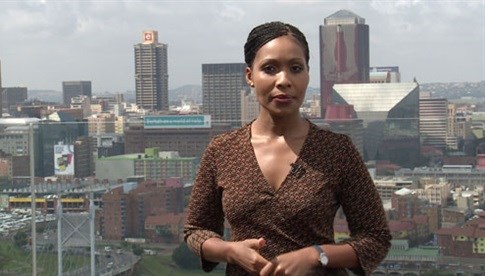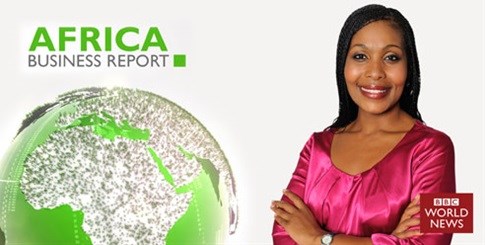African business reporting in the spotlight
If you thought the state of business in Africa was stagnant, think again. Lerato Mbele, Presenter of Africa Business Report on BBC World News, tells us about its vibrancy...
She's sharp, a true Afrophile and ever-so-informed. While Africa Business Report is a popular weekly programme produced out of Johannesburg, presenter Lerato Mbele is the true drawcard.
She talks to the people and businesses actively making a difference and effectively changing the economic face of Africa.

Lerato Mbele
But the programme is by no means limited to our shores, with BBC correspondents in each African country reporting on the growing trends and developments they notice, giving expert insight into our diverse continent.
I picked Mbele's brain on topics like the growth of entrepreneurship in South Africa and Africa alike, as well as key trends in business growth in Africa that you may have otherwise missed, and her personal media inspiration...
 Why is Africa Business Report aired on Fridays and Saturdays - aren't those days usually more entertainment news-centric?
Why is Africa Business Report aired on Fridays and Saturdays - aren't those days usually more entertainment news-centric?
Mbele: As BBC World News is a predominantly news-based channel, our main purpose is to break the stories that matter to our audiences from all corners of the continent, and indeed the world. Throughout the week BBC, World News airs live daily news programmes, like Focus on Africa and World News Today, as well as live programmes dedicated to global business, like World Business Report and Business Edition.
We're proud of our ability to invest in world-class programmes, which go beyond the headlines and get to the heart of the places we broadcast to; to examine their people, their ways of life and their economies. These programmes make up our weekend schedules, including Africa Business Report and long-form current affairs strands, like Our World.
 Makes sense. Tell us what goes into each show - how do you find your topics and interviewees?
Makes sense. Tell us what goes into each show - how do you find your topics and interviewees?
Mbele: We are quite an eclectic and dynamic mix of people on the Africa Business Report team. Our editor is a qualified accountant, I have a degree in development studies and economics, there's a photographer, a former business times writer and a diving instructor with a journalism degree. Everyone brings the range of their personal experiences to the production process, plus a strong sense of creativity. That means in each editorial meeting we tease out different perspectives, which enhances how we treat the research or vision of each episode. Above that, at the BBC headquarters in London, where our line-manager is based, there is a huge research division, with journalists who have covered Africa or business for decades, so their guidance is invaluable each week.
 Sounds like a great working environment. What's the team of BBC World News correspondents within each country like, who report on the growing trends and developments across the continent?
Sounds like a great working environment. What's the team of BBC World News correspondents within each country like, who report on the growing trends and developments across the continent?
Mbele: The BBC prides itself on having a network of 160 reporters and producers in over 40 African countries. My colleagues are children of the soil who have lived in Africa most of their lives and previously worked for local broadcasters. So they are authentically African, understand the local culture and have nuanced views of what's happening on the ground.
We have teams across the continent covering different areas, in Johannesburg because of the JSE and banks, we have the business team. In West Africa there is a team covering francophone Africa. We also have a state-of-the-art base in Dar es Salaam, Tanzania, and in Nairobi, Kenya to deliver the core of the BBC Swahili content across radio, television, digital and mobile services. In both Nigeria and Kenya there are teams looking specifically at the new security and military threats on the continent and we also cover health in detail.
 Comprehensive indeed. What's the greatest advice you've received as a journalist?
Comprehensive indeed. What's the greatest advice you've received as a journalist?
Mbele: "Respect the crew, they are the reason you look good." Cameramen/women and visual editors get the least credit, yet they are the reason that programmes look beautiful and interesting frame-for-frame. They deserve a lot of the recognition. Personally, I have learned that there is no reason to compromise yourself for fame. Rather, I try to build on my strengths, and develop an expertise, such as business, so that I'm more credible. However, in a global news setting, there are times when one needs to be versatile.
 That may well inspire others looking to follow in your footsteps. What advice would you give to young, budding entrepreneurs in Africa, based on the current state of business?
That may well inspire others looking to follow in your footsteps. What advice would you give to young, budding entrepreneurs in Africa, based on the current state of business?
Mbele: Learn as much as you can, markets are not difficult but they require technical know-how. So read, read, read...
 Who is your mentor in the media?
Who is your mentor in the media?
Mbele: I have many - I admire Felicia Mabuza-Suttle's tenacity in starting the first ever talk-show in SA around 1994, which was a game-changer for commercial viewing. I admire Oprah's humanity and business acumen and I admire the courage of women like the BBC's Lyse Doucet or CNN's Christiane Amanpour to work in places where others fear to tread.
 Tell us more about the changing economic face of Africa, and how some businesses are getting this right.
Tell us more about the changing economic face of Africa, and how some businesses are getting this right.
Mbele: The market is vibrant with nearly 200-million classified as the middle class. In every country, core infrastructure is now being built, which is creating access for rural communities in particular. In areas of scarcity, young IT entrepreneurs are developing apps or products that make people's lives easier. Fashion designers and artists have a flair for expression and now have access to the world stage by showcasing at the various fashion weeks worldwide.
Finally, banks and private equity players are leveraging new money to buy and build new businesses, and that is creating brand new industries - especially in countries like Angola, Ethiopia, Kenya and Nigeria. Passion is what drives most of these people, and they are willing to overcome any obstacle. That's why they are getting it right.
 Explain the importance of reporting specifically on African business at BBC World News.
Explain the importance of reporting specifically on African business at BBC World News.
Mbele: I've worked in Africa for almost a decade now. I fell in love with the continent on my first trip outside South Africa to Zaire in the 1990s. I knew then that I wanted to be part of something that affirms Africa. Africa Business Report has given me the opportunity to do just that.
To find out more, catch Africa Business Report on BBC World News (DStv channel 400) on Fridays at 21:40 and Saturdays at 12:10 and 20:10, and treat yourself to a taste of what you're missing if you're not already a regular viewer by watching the show teaser embedded below:

































 Why is Africa Business Report aired on Fridays and Saturdays - aren't those days usually more entertainment news-centric?
Why is Africa Business Report aired on Fridays and Saturdays - aren't those days usually more entertainment news-centric? 

